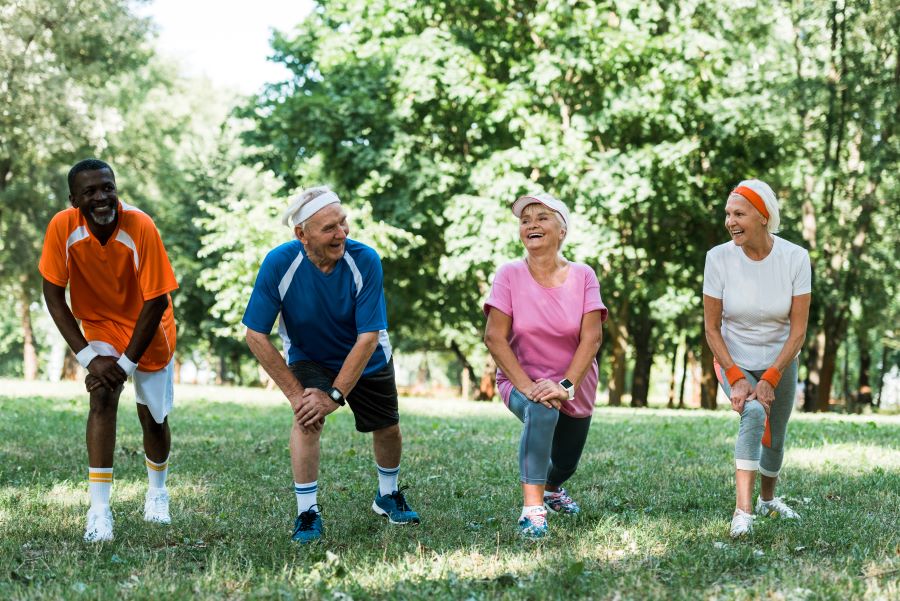
As we journey through life, the sands of time inevitably catch up with us. The passage of years can bring about a multitude of changes, from aching joints to a more leisurely pace. It’s easy to find reasons to forgo physical activity, with excuses ranging from age-related concerns to a lack of time or motivation. However, in our quest to unearth the truth about exercising and aging, we must dispel the myths and embrace the compelling reality that regular exercise remains an essential companion on this lifelong journey. It’s not about striving for perfection or competing with our younger selves; it’s about enhancing the quality of our lives and savoring the vitality that comes with staying active. In this exploration, we will dismantle the excuses, redefine what exercise means, and illuminate the undeniable benefits of staying active as we age. So, let’s embark on this enlightening journey of discovery, one step at a time.
Ditch the Excuses: Take the First Step!
Generating countless excuses to avoid physical activity is common, and some might seem convincing. However, it’s crucial to understand that remaining sedentary can lead to severe consequences. Every year, around 3.2 million people lose their lives due to physical inactivity. Consistent exercise, particularly for older adults, plays a pivotal role in preserving good health.
“I’m Just Too Old”
Exercise is beneficial for almost everyone, regardless of age. Even modest amounts of physical activity can yield substantial benefits. Before starting a new exercise regimen, consulting your doctor is advisable. If you’ve been inactive, begin gently, with, say, 5-10 minutes of moderate activity daily.
“I Just Need to Take It Easy”
The urge to rest isn’t necessarily an effect of aging but a consequence of inactivity. Even older adults with severe health conditions like heart disease, diabetes, or arthritis can enhance their quality of life by getting up and moving.
“I Don’t Think My Heart Can Take It”
The more active you remain as you age, the lower your risk of heart attacks and strokes. Your healthcare provider can recommend suitable exercises and their duration. Aim for around 150 minutes of moderate aerobic activity per week, such as brisk walking or easy cycling. Activities like mowing the lawn or thorough cleaning count as well, and you can break them into shorter sessions.
“I Don’t Move Like I Used To”
Incorporate flexibility-enhancing exercises into your routine, as they are one of the four key movement categories (alongside endurance, strength, and balance). Stiffness can be alleviated with targeted stretching exercises for areas like hips, legs, shoulders, neck, and back. Yoga can also aid in improving flexibility, but it’s essential to avoid overstretching.
“I Am What I Am”
Recent research indicates that certain exercises, such as stationary cycling, can slow down cell aging as you grow older. In other words, it’s never too late to reap the benefits of exercise. Regardless of your age, activity level, or past fitness, exercise can provide substantial benefits.
“I’m Afraid of Hurting Myself”
To ensure your safety, consult your doctor, particularly if you’ve been inactive or have underlying health issues. Your healthcare provider can guide you on what’s suitable for you. Experts recommend starting slowly with low-intensity exercises, staying hydrated, listening to your body, warming up before your workout, and cooling down afterward.
“I Don’t Like Exercise”
Physical activity doesn’t always involve lifting heavy weights or running long distances. Engage in activities that you genuinely enjoy to stay motivated. You could tend to your garden, walk with friends, do yard work (which offers flexibility and strength benefits), or go for a bike ride. Occasionally switching things up can prevent boredom.
“I Don’t Have an Exercise Buddy”
Having a workout partner or joining a group can provide valuable support and motivation. Studies show that supervision and encouragement can help you stay committed and feel positive about your fitness journey. If you prefer not to exercise alone, look for local groups or online communities, or consult your doctor for guidance.
“I Don’t Have the Time”
A busy schedule, whether due to grandchild care, family responsibilities, household chores, or other commitments, can be a common excuse for skipping exercise. However, when you consider the numerous advantages of regular physical activity and the minimal time required (150 minutes of moderate aerobic activity per week), it becomes evident that finding time for your health is achievable.
“My Heart’s Fine”
Exercise benefits more than just your heart. It also improves lung and muscle function and enhances your overall circulatory system. These advantages include lower blood pressure, improved bone and joint health, and reduced risk of conditions like colon cancer and diabetes.
“I’m, Afraid of Falling!”
Falls can be a concern for older adults, but regular physical activity, including balance-promoting exercises that can be performed almost anywhere, can help prevent these accidents. Consult your doctor for guidance in choosing the right exercises.
“I Worry More About My Brain”
Exercise is highly beneficial for your cognitive health. It not only helps prevent mental health issues like depression and anxiety but also enhances your focus and ability to tackle tasks efficiently. A healthy body contributes to a healthy mind.
Etaying active as we age is a gift we give ourselves, and age is just a number on this incredible journey of life. So, as we part ways, remember this: Keep moving, keep exploring, and keep embracing the joys of an active, healthy life. It’s a path that’s always open to us, no matter where we are in our journey. Take care, my friend, and here’s to a lifetime of well-being!

Leave A Comment